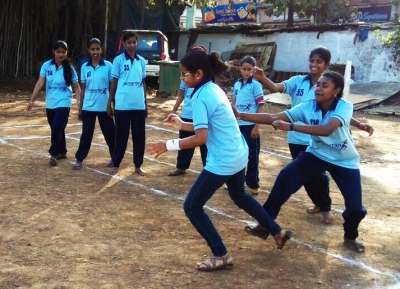
In the lead-up to the Sustainable Development Goals, sport is increasingly recommended as a mechanism to increase adolescent girls’ self-esteem, self-confidence and educational aspirations. In this context, Dr Madhumita Das was invited to the Women Deliver Conference, to make a presentation at the Girl Power in Play symposium (Ottawa, Canada, 18–19 June 2015) on Parivartan for Girls, a study by STRIVE partner the International Center for Research of Women (ICRW-ARO). The backdrop of the FIFA Women’s World Cup Canada 2015 ensured media and political attention for the symposium, where Dr Das presented to international NGOs, UN agencies and corporations. Women Deliver, UNICEF, Right To Play, One Goal, and the Global Alliance for Improved Nutrition (GAIN) hosted the event.
Presenting Parivartan for Girls
In her first presentation, Dr Das highlighted the latest evidence of the benefits of sport for girls and women. Where other organisations are purely focused on sports programmes, however, Parivartan for Girls addresses gender equity and social norms by involving girls as both mentors and players. To address normative and structural barriers requires action on safe public spaces, women’s position and perceptions of girls in society.
Gender is a silent issue in many of these presentations. Yet this is exactly what sports programmes need to address.
Madhumita Das, ICRW-ARO
Dr Das’s second presentation focused on early pregnancy, highlighting the ways in which Parivartan for Girls broaches life skills, health and rights, with sport as a means to reduce early pregnancy, maternal mortality and HIV risk. The programme provides girls with a safe context in which to discuss otherwise taboo subjects including bodies, safe sex and choice of partners.
Safe spaces for girls
We talk about sport but do we think about safe spaces? When we take girls out of their homes, are we increasing their risk and vulnerability?
Madhumita Das, ICRW-ARO
Attendees showed keen interest in protecting girls’ right to play sport in situations where this is not common. Plenary discussions addressed ways to forward the agenda:
- How do we go about making public spaces safe for girls?
- How do we engage parents?
- How do we involve other donors and leverage support?
The case for investment
High-level government officials, professional and Olympic journalists, influencers, youth, international NGOs, experts and girls and women involved in sports participated in discussions about
- national-level policies on paper and in practice
- additional research on developing countries’ efforts to encourage sport for girls
- increased funding and programmes to involve girls in sport as a means to improve to health, education, nutrition, life-skills and gender equality
We bring different kinds of discourse to this platform. The contribution by STRIVE and ICRW-ARO allows people to think more about gender and social norms and not just sports.
Madhumita Das, ICRW-ARO
Taking action
Co-hosts of the symposium formally launched an advocacy campaign called Girl Power in Play. The centrepiece is a Call to Action for global leaders to ensure that sports are incorporated as an empowering process, listing specific actions by sector.
Governments
- Invest in and implement national policies, laws and plans that enable women and girls to exercise their right to sport and play, and to level the playing field – allocating resources for girls’ and women’s sport in equal proportion to boys’ and men’s.
- Integrate girls’ and women’s participation in sport within broader government strategies in education, nutrition and health as a means of advancing the gender equality, rights, wellbeing, and economic empowerment of girls and women.
- Ensure that girls’ and women’s participation in sport is safe, without fear of violence, discrimination or harassment.
- Compile and report gender disaggregated community- and national-level data on sport participation.
Donors
- Expand support for sport programming targeting girls and women, particularly among under-served populations.
- Support research to build the evidence base on the benefits of sport for girls and women, particularly relating to progress on their rights, wellbeing, economic empowerment, and health – including sexual and reproductive health and rights – and addressing gender based violence.
- Integrate sport for girls and women within other donor initiatives targeting women and girls, including maternal health, girls’ education, life skills training, nutrition, sexual and reproductive health, and economic empowerment.
Sport-related federations and NGOs
- Establish and implement policies and programmes that recognise the holistic benefits of sport for women and girls, promote gender equality both on and off the field, and ensure their participation in a safe environment.
- Develop and disseminate best practices and tools that are specific to girls and women in sport programming, including monitory and evaluation frameworks.
- Create or expand programming, which recognises and leverages the health, rights, wellbeing, nutrition, education, and economic empowerment of girls and women.
- Make information, tools, curricula, and other related materials free and available to the general public to increase uptake and quality of programming; and work toward gender equity in staffing at all levels, from coaches, to management, to boards.
Researchers
- Integrate girls’ and women’s participation in sport within broader government strategies in education, nutrition, and health – including sexual and reproductive health and rights - as a means of advancing the gender equality, rights, and wellbeing, and economic empowerment of girls and women.
- Conduct research to make the case for investing in girls’ and women’s sport, and aim to address the research gap related to the participation of girls and women in sport in low- and middle-income countries.
UN Agencies and Member States
Recognise that participation in sport is an important accelerator to achieve the Sustainable Development Goals – particularly in health, education, gender empowerment, nutrition, poverty reduction, and peace – and ensure that sport is reflected in the implementation of these goals.
Media
Address stigma and beliefs that prevent girls and women from participating in sport.
Resources
News
- North-South learning on sports-based violence prevention
- Sport to empower Indian schoolgirls
- Launch of a sports-based programme for girls
- Parivartan for Girls programme launched in Mumbai (photos)
Blogs
Programme tools